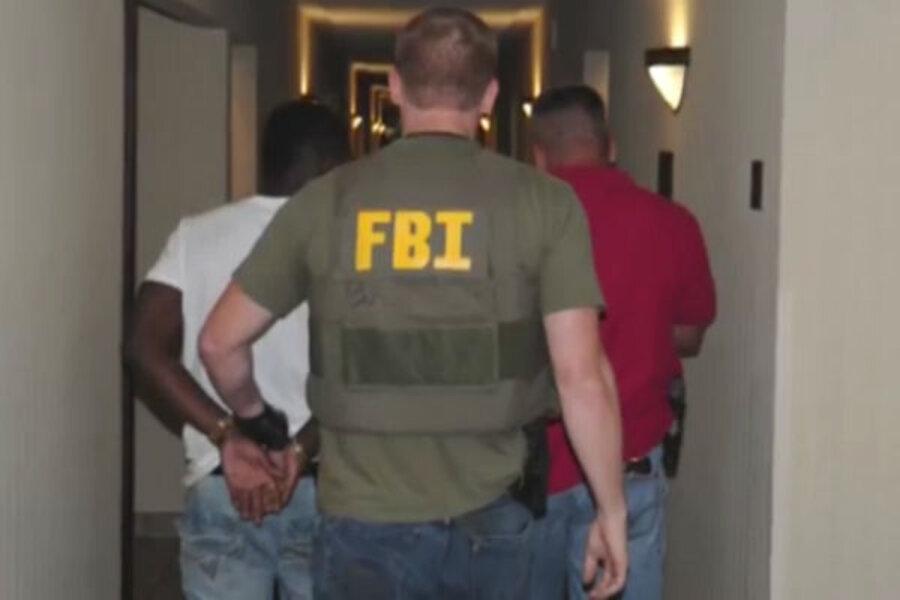Details of child sex trafficking in US raise new concerns
Loading...
WASHINGTON – When FBI agents and police officers fanned out across the country in June in a weeklong effort to rescue child sex trafficking victims, they pulled minors as young as 11 from hotel rooms, truck stops, and homes.
Among the 168 juveniles recovered was a population that child welfare advocates say especially concerns them: children who were never reported missing in the first place.
Advocates say the roundup reinforces the need for a standardized, nationwide approach to report children as missing, especially those absent from state foster care systems who are seen as most vulnerable to abuse. Concerns over unaccounted-for children aren't new, but they're receiving fresh attention amid heightened awareness of child sex trafficking. State and federal efforts are underway to streamline how police are alerted when kids go missing.
"This has been a movement that I would say over the last year has really galvanized," said John Ryan, president of the National Center for Missing and Exploited Children. Legislation pending in Congress would require child welfare agencies to alert police and the center, which has specialized response teams and other resources, within 24 hours of receiving information about a child's disappearance.
The current patchwork of state and federal policies has yielded what advocates describe as a fractured safety net with little accountability.
Though states may have policies directing child welfare agencies to report missing children to law enforcement, most don't have laws requiring that notification, according to the missing children center. That means children can disappear without police knowing they're missing or being directed to look for them.
A federal law does require law enforcement agencies to enter missing children into the FBI's National Crime Information Center – a database available to law enforcement nationwide – but that presumes police are provided the names or have specific enough details about a child. A 2011 Government Accountability Office report said law enforcement agencies are having trouble getting timely information from state agencies.
Some children who are feared missing turn up after just a few hours. In some cases, children involved in sex trafficking leave their homes to meet their pimps for work and then return before their absence is noticed. The center worries about them as well.
The missing children center says it received more than 57,000 missing-child reports between 2009 and 2013, many of them considered endangered runaways. Of the children reported missing to the organization who were also likely sex trafficking victims, about two-thirds were in the care of child welfare systems when they ran away.
The difficulties aren't limited to foster care. In the most recent action, called Operation Cross Country, far more children came from single-family homes than from families under state supervision, the FBI said. But experts say they're concerned that children in foster care, who often come from more troubled backgrounds, are particularly vulnerable to being targeted by sex traffickers.
"These pimps really know how to appeal to these kids. A lot of these pimps come from similar backgrounds as well. They can lure them in by providing them care, feeding, attention," Joseph Campbell, assistant director of the FBI's criminal investigative division, said in an interview.
In a transient child welfare system, it's a challenge for states to keep perfect track of children under their care. Many run away repeatedly but return on their own, giving guardians little incentive to report them missing each time. The Internet enables children to be prostituted through online advertisements instead of street corners, making it easier than ever for trafficking to cross state lines.
"When you come across a child and you have no information on who they are, it becomes difficult to, first of all, ID them – you don't know if there are warrants for them or if there are medical needs for this child," or if they're supposed to be under state care, said Michael Osborn, chief of the FBI's Violent Crimes Against Children unit.
About one-third of the kids rescued in the most recent Operation Cross Country had previously been reported missing, Osborn said, though some of the others simply hadn't been gone for long enough stretches of time to raise concerns from their guardians.
State policies vary.
The Minnesota Department of Human Services is in the process of issuing a bulletin to county agencies instructing them to reporting missing foster children to local law enforcement and the missing children center. It plans to propose legislation to that effect next year. Nebraska urges foster guardians to directly file missing children reports with police. The state says it will monitor the situation and contacts police if the foster parent doesn't.
A new Georgia law expands who can report a child as missing to include any caretaker or government entity responsible for the child, not just the parent or guardian.
Florida developed new policies following the 2000 disappearance of foster child Rilya Wilson, whose caseworker lied about visiting her while filing false reports and telling judges the girl was fine.
Sen. Ron Wyden, D-Ore., a sponsor of legislation that would require child welfare agencies to provide notification of missing children, said failure to do so is a "moral blot on our country."
Mr. Wyden has previously introduced similar versions of the bill, but this year those provisions were folded into broader legislation that, among other things, would increase incentives for adoption. Aides say the measure, which last week passed the House, has bipartisan support.





